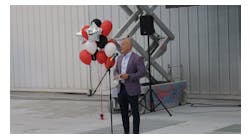As the world enters the second year of the COVID-19 pandemic, MTU Maintenance is focused on supporting their customers in the hard-hit aviation industry.
“As a result of the current crisis, airlines are extremely focused on cash management and MRO fleet planning is highly dynamic. We are supporting our customers and partners with scenarios and engine MRO strategies to maximize the use of existing assets, but also to avoid unnecessary spend. This will continue into 2021 and beyond, depending on how the industry restarts,” said Martin Friis-Petersen, SVP MRO programs, MTU Aero Engines.
“During such an uncertain market environment, airline fleet planning must be built on accurate and timely recommendations as to the most economic MRO strategy for their fleet. MTU provides optimized support through its fleet management tool for more informed decisions and, in a restart scenario, which engine to reactivate first,” Friis-Petersen continued.
MTU Maintenance globally offers customized service solutions for aero engines, offering a wide range of individually-tailored solutions encompassing innovative MRO services, integrated leasing and asset management.
“At MTU Maintenance, we understand that operators require services tailored to their specific needs in order to control and optimize cost. Additionally, we know that residual value is key to lessors and asset managers. They rely on smooth transitions and intelligent exit strategies to maximize utilization and value of their assets,” Friis-Petersen noted.
MTU Maintenance has 5,000 employees from more than 60 nationalities, who work on the 30 engines in MTU’s portfolio.
“MTU Maintenance has performed more than 20,000 shop visits in 40 years. We combine this engineering expertise with in-depth market understanding and robust financial strength to create the best solutions for our customers,” Friis-Petersen explained. “We marry world-class engineering with intelligent creativity and never give up unless an optimal solution has been found.”
In 2006, the company introduced their engine trend monitoring tool, which has been continually developed since. In the face of the COVID-19 pandemic, MTU Maintenance is, “now taking it to the next level and integrating it into engine fleet management software to support our customers,” Friis-Petersen said.
“Using this software, an intelligent maintenance costing and planning tool, we generate engine fleet management scenarios and work scopes. Smart predictions and artificial intelligence enable customized, immediate and proactive MRO planning options — not currently available on the market today. Fleet planning scenarios can be immediately and endlessly adapted as the financial, technical, operational, environmental and market considerations continually change — as we are experiencing daily at this time,” said Friis-Petersen.
“We strongly believe that digital services will support an effective post COVID-19 industry restart.”
In addition to their focus on digital fleet planning services, MTU Maintenance has introduced LEAP MRO to their facility in Zhuhai, China. MTU Maintenance will also be performing full disassembly, assembly and test MRO for PW1100G-JM engines at three facilities — MTU Maintenance Hannover, MTU Maintenance Zhuhai and EME Aero — by mid-2021, as well as repairing parts at MTU Maintenance Berlin-Brandenburg.
Additionally, MTU Maintenance is building a new repair facility, MTU Maintenance Serbia, near Belgrade as well as a second facility at MTU Maintenance Zhuhai in the neighboring Jinwan district. “As such, we are well positioned for organic growth once the industry recovers,” said Friis-Petersen.
As a result of the pandemic, the aviation industry is currently experiencing a crisis and airlines are in survival mode, but Friis-Petersen said that MTU Maintenance noted the following trends emerging from the past year.
Narrowbody aircraft were first reactivated in regions with positive recovery trends. “For instance, after reduced demand in the second quarter, we saw recovery in demand for V2500 and CFM56 engine MRO with specific regions like China driving the recovery towards the end of 2020,” Friis-Petersen noted.
MTU Maintenance further noted a shift in the widebody customer segment towards cargo operators that have experienced anti-cyclical demand in comparison to PAX WB operators. “Engines from cargo operations have been consistent throughout, as many cargo operations have been flying at 100% or more. At MTU for instance, we have seen continued and steady demand for MRO services on engines such as the CF6-80C2, GE90 Growth and PW2000,” explained Friis-Petersen.
Demand for services for newer engine types, such as retrofits for the PW1100G-JM or Leap-X workload, was also robust in 2020, noted Friis-Petersen, mirroring the enhanced flight utilization of these newer engine types.
“New generation engines will remain important programs in our network in the coming years also, as so far, the majority of the aircraft that have returned to service are the newer and more popular types,” he said.
And finally, Friis-Petersen said that the effect of the most recent wave of lockdowns and restrictions remains to be seen in 2021.
“Flexible work scopes and MRO services across all engine types will be key to continued competitiveness throughout the year. Whatever the industry recovery scenario, MTU Maintenance is well positioned to flexibly adapt. We are confident that our predominantly narrow body portfolio, worldwide presence diversified customer base will enable us to respond to market needs when flight operations recover,” he said.
Heading into the future, Friis-Petersen said that MRO providers must intelligently meet airlines’ goals to provide the best solution for customers in today’s market. “We are working extremely flexibly with all customers at this time to ensure that they receive the services they require. We expect to see a continued trend away from traditional planning with fixed maintenance intervals to more individually-tailored solutions.
“Some airlines are concentrating on short-term savings with cash preservation as the main objective, while others are focusing on long-term planning. Furthermore, we have been seeing more of a focus on on-wing/near-wing repairs, smart repairs and we are closely following the market development of used serviceable material (USM) availability,” Friis-Petersen said.
“Through our leasing and asset management arm, MTU Maintenance Lease Services, we are an active player in the engine asset and USM market and expect the availability of green time engines and USM to increase throughout 2021. Thanks to our financial strength, we will be able to take advantage of this availability and in turn, offer the best, most cost-effective solutions to our customers,” he stated.




